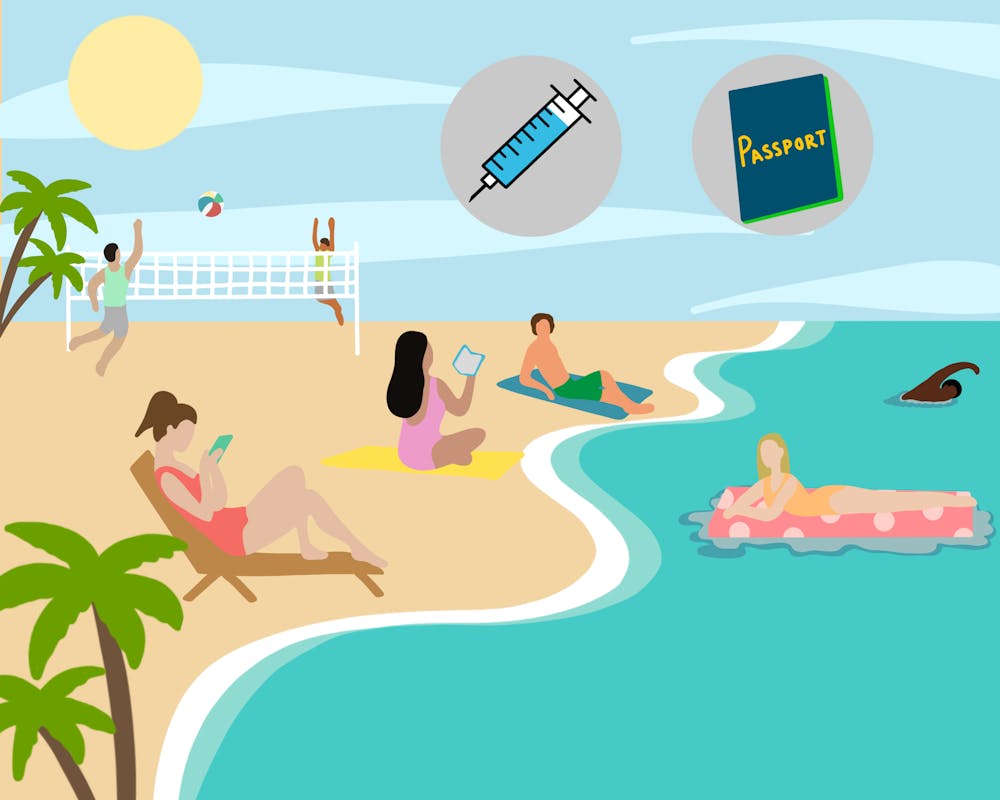In early March, students enjoyed a full week off of classes for spring break. While historically spring break is a University standard, the week-long break followed last year’s “break days” due to the COVID-19 pandemic.
In place of a full week off classes last spring, University administration replaced the week with four singular break days interspersed throughout the semester to try and limit student travel and prevent a spike in cases.
With more than 99 percent of students and 85 percent of faculty fully vaccinated and boosted this year, University administration decided that COVID-19 posed a low enough risk to the community to reinstate a standard break. When break started March 5, there were 132 active cases of COVID-19 within the University community, a 69.5 percent reduction from two weeks prior according to the University’s COVID-19 tracker.
In interviews with The Cavalier Daily, students shared that they took the week off of school to relax, travel both domestically and internationally and see family and friends.
First-year College student Sarah Mohamed had the chance to reconnect with family in Sudan. Mohamed spent the week in Sudan at a cousin’s wedding, unplugged from all schoolwork and allowing herself to enjoy the company of family she hadn’t seen in years.
“Being back with family was the best part of my break,” Mohamed said. “Because of COVID-19, it’s been five years since I’ve seen some of them and a lot can change in five years so it was nice to regroup and see everyone.”
Another student who took advantage of the break to travel internationally was second-year Engineering student Stella Banino, who headed to the Bahamas with friends. After not having a spring break during her first year of college, Banino expressed that she was able to fully appreciate the time off of school this year.
“I realized how much better it is to have a full week off,” Banino said. “You get time to actually unwind whereas when it was just one day in the middle of the week it didn’t feel like a break because you still had assignments due that week so you couldn’t relax.”
Banino echoed Mohamed in sharing her belief that spring break is important for students’ mental health, allowing them time to take a full break from the stresses of the academic year.
“Having that time to completely unplug from school for a chunk of time that you don’t get otherwise was really nice,” Banino said.
First-year College student Hugh Trotter traveled to New Orleans with friends from school, and further elaborated on the widely held belief among students of the importance of a full week of break to replenish mental health.
For Trotter, a break is particularly important in light of the fact that many professors schedule midterm examinations for the week before break, forcing students to juggle one or more major assessments in a single week.
“Spring break is super important to give your mind a break and not get burnt out,” Trotter said, as he and others had a busy and stressful few weeks of school work before the break. He also mentioned the importance of getting off-Grounds and taking a break from the “college lifestyle”.
First-year College student Renee Grutzik exemplifies Trotter’s point, as she faced four exams within a period of three days leading up to the break. For break, Grutzik headed to New York City with a friend.
“Before I left for break I was feeling very stressed out because I had four exams over the course of three days,” Grutzik said. “Luckily I survived my exams and got a whole week of spring break to relax.”
For some students, this was their first time traveling internationally since the COVID-19 pandemic began in March 2020, and all traveling students had to factor in COVID-19 restrictions and requirements for entering foreign countries.
Many countries, like the Bahamas where Banino vacationed, require a travel health visa. Banino shared that all travelers entering the country had to upload several required documents — including a negative COVID-19 test and health visa — and get them approved by Bahamian officials a few days before the trip.
“You had to take a COVID test immediately before and get the results back instantly so it was stressful,” Banino explained. “Applying for health visas and getting all the documents submitted in the short timeframe was a lot to manage.”
COVID-19 requirements did play a role in students’ domestic travel as well, but for those who are vaccinated the regulations did not pose a significant barrier. Trotter in New Orleans and Grutzik in New York City mentioned the cities’ indoor vaccine requirements, but said that their vaccination status meant it was not a trouble to get into indoor establishments.
The break proved to be a needed opportunity for students to recharge and take a step back from academics. It also gave people the chance to travel and spend time with family and friends — both of which have been difficult since the pandemic started two years ago.







